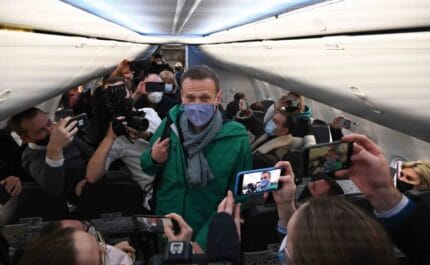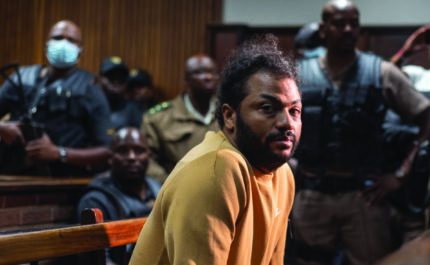Was Tokyo 2020 worth it?
The Olympic and Paralympic Games were supposed to reinvigorate Japan and jumpstart its stagnating economy, but as the Covid-19 pandemic ripped through the world it seemed doubtful whether Tokyo 2020 would happen at all. Here's the behind-the-scenes story of the most remarkable sporting event in living memory
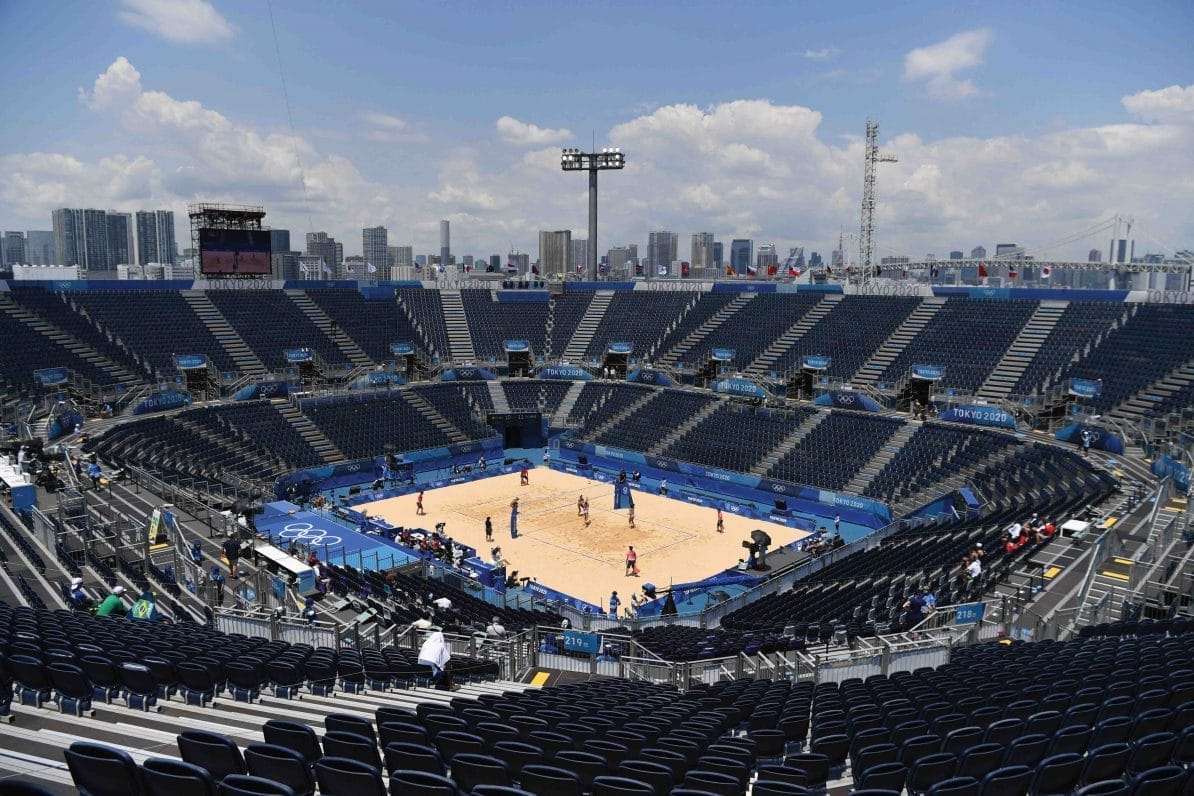
Brazil and Argentina compete in front of empty stands during the women’s Olympic beach volleyball tournament at Shiokaze Park, Tokyo, 24th July 2021
23rd July 2021 (Taken from: #44)
On Saturday 7th September 2013, the Japanese delegation at the Hilton Buenos Aires erupted in joy as the name Tokyo was read out. Normally stoic black-suited men jumped up and down and frantically hugged each other. Some wept with happiness. When the news broke in the Japanese capital that the International Olympic Committee (IOC) had selected it as host city for the 2020 Olympic and Paralympic Games, the reaction was equally jubilant. Thousands of residents had stayed up for all-night viewing parties to watch the result announced at 5.20am local time. Just as with the 1964 Olympics, which heralded the reemergence of Japan after its devastation during World War II, many felt that hosting the 2020 Games would have a transformative effect on the country.
For some, the news that the Games were coming to Tokyo was a welcome balm for nerves that were still frayed following the earthquake, tsunami and nuclear disaster that struck the north-eastern Tōhoku region of Japan in March 2011, killing 20,000 people, injuring 6,000 more and displacing nearly half a million from their homes. Tokyo 2020 was billed as the ‘Recovery and Reconstruction Games’, and its torch relay was set to begin in Fukushima as a “flame of recovery” for the disaster-hit region. “The moment of truth is coming,” said then-Japanese prime minister Shinzo Abe in Buenos Aires. “We’d like to do our best to live up to your expectations.” Nobody in that heady moment could have imagined how Tokyo’s Games would turn out.
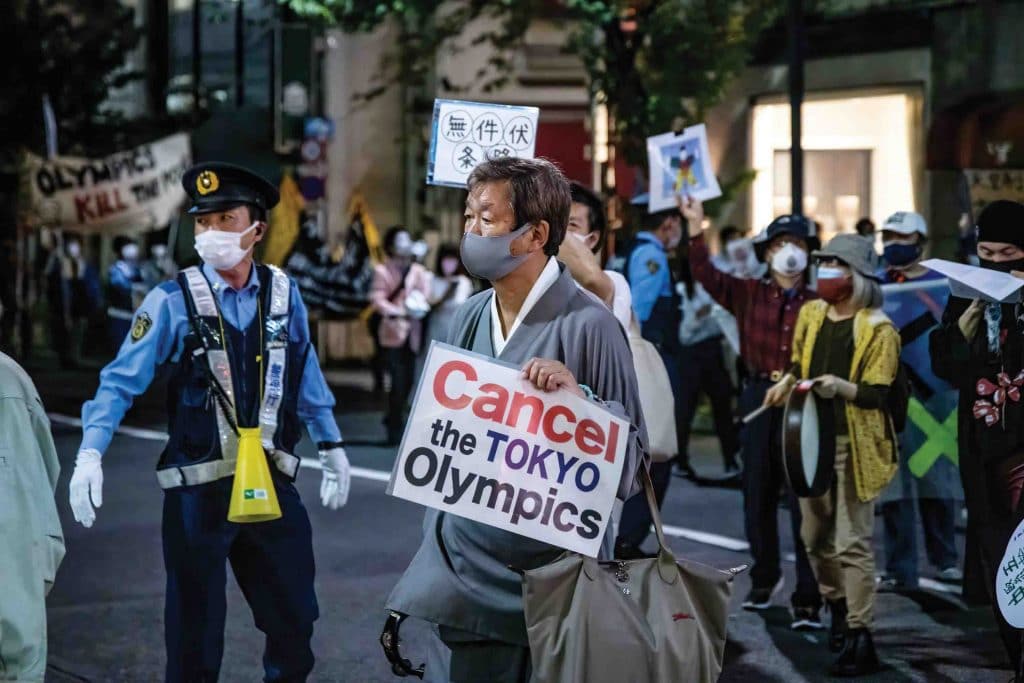
Protesters call for the Olympics to be cancelled at a demonstration in Tokyo two months before the Games begin, 17th May 2021. Photo: Viola Kam/SOPA Images/LightRocket via Getty Images
On Saturday 31st July, 2021, day eight of Tokyo’s Olympic Games, a queue of people snaked down the road alongside Yoyogi Park, just steps from Yoyogi National Stadium. They were not there to watch the world’s elite athletes compete, however, but to enter a government-run Covid-19 vaccination centre. Elsewhere in Tokyo the streets were nearly empty. There were hand-sanitiser dispensers in every shop. The city’s famously dynamic nightlife was non-existent.
Restaurants and bars had been instructed to close by 8pm in accordance with Tokyo’s fourth state of emergency since the pandemic began, ordered by Tokyo governor Yuriko Koike just before the Games launched, in a desperate attempt to halt the spread of Covid-19 infections which were rising to record levels. The situation upset many local residents, who were disgruntled at having to stay home while their taxes funded an event they were largely unable to enjoy – and which was feared as a potential catalyst for infections that could introduce new Covid-19 variants into Japan’s population. The government had also come under heavy criticism for its sluggish vaccination programme, with many blaming the low inoculation rates in Japan for the decision to bar local spectators from the Games, which was made just over two weeks before the opening ceremony. The sporting venues themselves – heavily policed and surrounded by barricades – were eerily silent, with some compensating for the lack of spectators by piping in the sounds of cheering crowds, to ease the disorientating stillness.
The Olympics had been due to start a year earlier, on 24th July 2020, with the Paralympics following a month later. But with countries pulling out due to the unfolding Covid-19 pandemic, and pressure mounting on the International Olympic and Paralympic Committees, it was announced in March 2020 that both would be postponed until 2021 (although the ‘Tokyo 2020’ moniker would be retained to avoid the headache of rebranding official Games merchandise). Still, many doubted the Games would escape cancellation – even some of those responsible for staging them.
“We always publicly said that we believed the Games would happen,” says Craig Spence, who is director of media and communications at the International Paralympic Committee and was involved with Tokyo 2020 from the bid phase to the closing ceremony. “But there were some very dark days when we were thinking, ‘There’s no way we’re going to put this on.’”
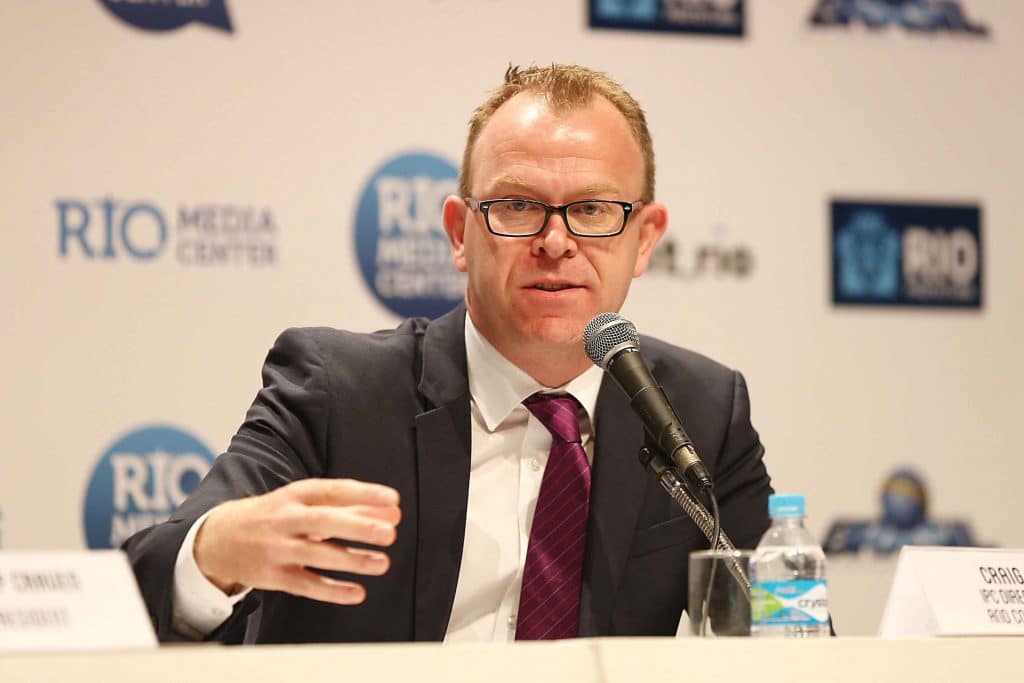
Craig Spence, director of media and communications at the International Paralympic Committee. Photo: Joe Scarnici/Getty Images
“Holding the Games during a global pandemic required us to create our own roadmap from scratch,” says Masa Takaya from the Tokyo 2020 organising committee, who was one of the jubilant delegates in the Argentinian capital in 2013. “This in itself is a kind of legacy for Tokyo 2020.” Hosting a Games in Covid times meant rewriting the rule book. “When you win the right to stage a Games, each organising committee is given a library of over 100 technical manuals,” explains Spence. “Each functional area is covered – so there’s one on accommodation, one on security etc. But there isn’t a manual that says how to organise a Games during a pandemic. We had to reassess every single element, from the moment people left their home countries to the moment they left Japan. And the clock was ticking.”
So too was the count of Covid infections. Over the 16 months Spence, Takaya and their colleagues had to prepare for Tokyo 2020, cases soared across Japan. In the week the Games were postponed, there had been 647 confirmed cases in the country. In the first week of 2021, nine months later, there were 39,821. Each new case – and the emergence of variants in other countries – further hardened the growing local opposition to an event that would see tens of thousands descend on the city from all across the world.
Anti-Olympics protests began long before the pandemic. Memes circulated shortly after the announcement of Tokyo as host city, including one depicting the Olympic rings repurposed as radiation hazard symbols. This was a particularly acute jab since Prime Minister Shinzo Abe had proclaimed during the Buenos Aires gathering in 2013 that the Fukushima nuclear disaster situation was “under control” – this despite radioactive water leaking into the Pacific Ocean at that very moment.
Protest groups such as Hangorin No Kai (“Anti-Olympics Committee”) voiced strong concerns over the Games, including objections about increased policing due to a new anti-terror law and about the logging of rainforests for wood to build stadiums. Such groups, whose messages often had strong anti-capitalist tones, were largely dismissed in Japan as fringe elements, but as Covid infections soared, their anti-Olympics stance found new sympathisers. In May 2021 one poll by the newspaper Asahi Shimbun had more than 80 percent of the Japanese public against holding the Games.
There were some very dark days when we were thinking, ‘There’s no way we’re going to put this on’”
There was particularly vociferous dissent from doctors, with one hospital in Tachikawa, western Tokyo, posting signs in its window saying “The medical system has reached its limits. Stop the Olympics!” Opposition was also strengthened by a series of high-profile scandals beginning in early 2021, which saw a succession of organisers sacked for their derogatory comments against women, past bullying of disabled people and jokes about the Holocaust.
Associate professor Satoko Itani, whose focus is sport, gender and sexuality studies at Kansai University, has long been involved with anti-Olympics movements. Itani felt that the uprising against the 2020 Olympics was different, and that protesters actually had the potential to change the course of the Games. “This is the first time in a really long time that a vast majority of Japanese citizens said no to a major national event,” says Itani. “The anti-Olympic movement even had mainstream media and scholars across different fields on their side, until the Games started.”
One week before the opening ceremony, dozens of protesters gathered in front of the Tokyo 2020 headquarters. As with the previous protests and marches, they were surrounded by police officers, and flashed signs with messages including “The lives of the public are more important than the Games” and “Olympics kill the poor”. They used megaphones to chant “We don’t want the Olympics” and “Go to hell IOC!”.
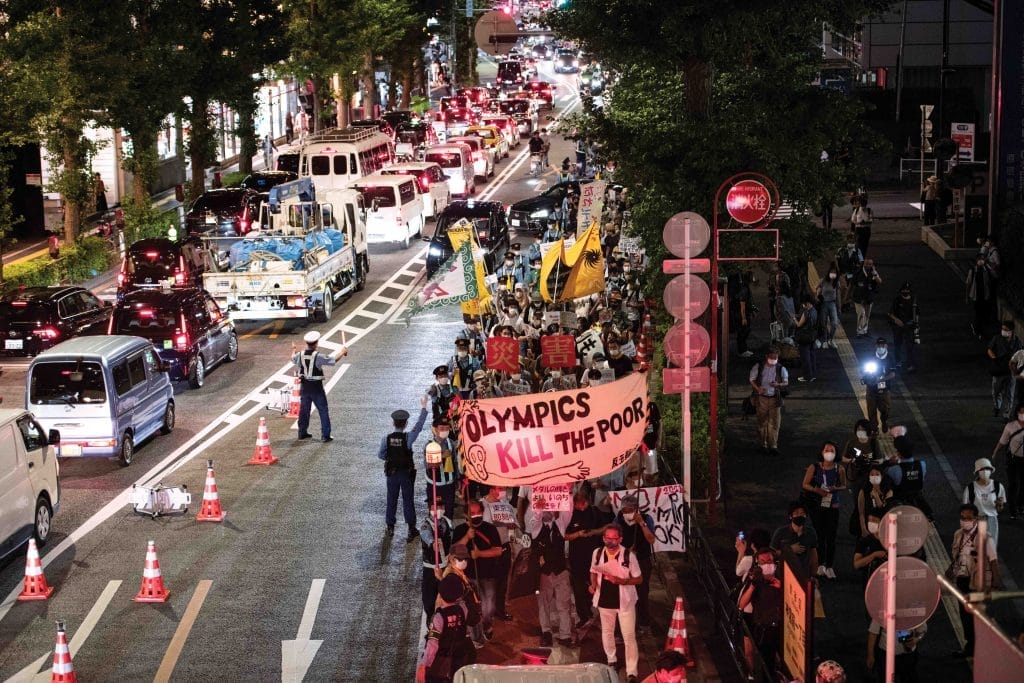
Protesters march ahead of the Olympic Games opening ceremony, 23rd July 2021. Photo: Yusuke Harada/NurPhoto via Getty Images
Even as a senior member of one of the organising committees, Craig Spence could see why some were calling for the Games not to go ahead. “We totally understood where the public was coming from,” he says. “What was difficult was knowing that we were putting in place a very good plan that was going to keep everyone safe. It was untested, but we were really confident.” Spence was also concerned about the political pressure being put on Yoshihide Suga – who took over as prime minister after Abe stepped down in September 2020 – to cancel the Games. “The prime minister’s approval rating was falling by the day,” says Spence. “And you’re thinking, ‘Are they [the government] going to stay strong?’ The constant speculation from the media was horrendous. It was playing with your head: why are we doing this if it’s going to get cancelled?”
For all the speculation, Jules Boykoff, associate professor of political science at Pacific University in Oregon, and a fierce critic of the Olympics, never thought cancellation was a serious option. “The host-city contract gives extraordinary power to the IOC,” he says. “It gives them sole power as to whether to cancel the Olympics or not, and they were absolutely not going to. This is their golden cash spigot and they weren’t about to winch it shut just for some health concerns on the part of the host.”
Boykoff believes the sporting prowess on display at the Olympics masks a lack of accountability for the actions of the corporate and political forces involved in the Games. “On one hand, you’ve got this happy face where you’ve got all these wonderful athletes who I respect on many levels,” he says. “On the other hand, we’ve got forces that are not so wonderful that use the Olympics for their own self-interest, and it also deprives the locals of democracy. I think there’s a real democratic deficit that’s ingrained in the Olympic Games.”
The prime minister said that he did not have the power to cancel the Olympics. That must’ve been humiliating”
Boykoff, whose four books on the Games include Power Games: A Political History of the Olympics, believes the Olympics and Paralympics represent an example of “celebration capitalism” in which the feelgood factor generated by hosting the world’s biggest sporting events is used by authorities to “do all manner of things they’d never be able to get away with during normal political times”. He highlights patterns that have recurred in the run-up to recent Games: overspending, the militarisation of public space, greenwashing and gentrification including forced displacement. He believes Tokyo 2020 demonstrated all of them: the costs rising from $7.3 billion in the bid document to an estimated $28 billion according to Japanese financial newspaper Nikkei; the introduction of facial-recognition systems ahead of the Games; and the relocation of economically disadvantaged people to make way for Olympic venues which would, in turn, be turned into luxury real estate projects. “I was in Tokyo in 2019 and met with people displaced by the 1964 Olympics and they were displaced again out of their public housing for the 2020 Olympics,” he says. “They were so scared that they wouldn’t even let us use their actual names; they were afraid of retribution.”
Boykoff also believes that Tokyo 2020 failed to live up to its promise to be the ‘Recovery and Reconstruction Games’. “They said that holding the Olympics was going to help the regions [affected by the 2011 earthquake, tsunami and nuclear disaster],” he says. “Nothing of the sort happened; in fact, people I interviewed in Fukushima told me that the Olympics had a negative effect on the recovery. It slowed things down because the cranes and the equipment and the human power was in Tokyo preparing for the Olympics, and not in Fukushima. It was just more spectacle than actual recovery or anything resembling actual green advances.”
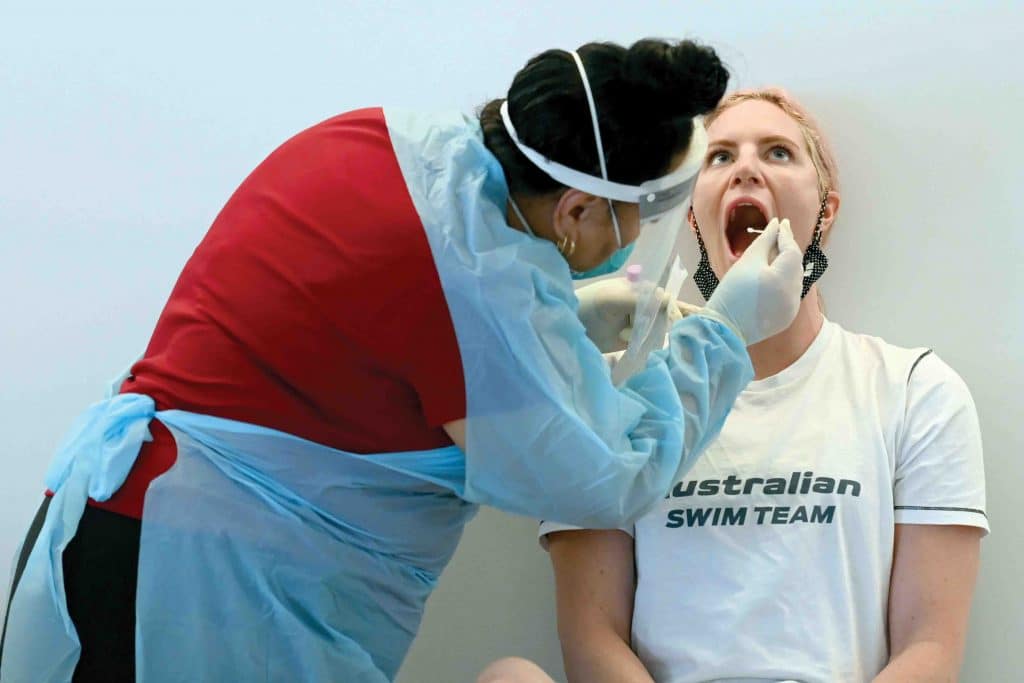
Australian swimmer Emily Seebohm has a Covid-19 swab test before departing for Tokyo, 14th July 2021. Photo: Delly Carr/Swimming Australia via Getty Images
On 23rd April 2021, in the course of announcing yet another state of emergency brought on by the pandemic, Yoshihide Suga said: “The IOC has the authority to decide and the IOC has already decided to hold the Tokyo Olympics.” Boykoff believes the moment was a shocking reminder to the world of just how much power the IOC wields. “The prime minister of Japan said publicly that he did not have the power to cancel the Olympics,” he says. “That must’ve been humiliating for him to admit, but he was right. Never before have we seen this kind of face-off. Honestly, I can’t think of an Olympics where it was quite so obvious that the IOC looks out for itself more than anybody in the host city.”
Spence strongly rejects the suggestion that there was ever a face-off between the government and the organising committees. “The people who never flinched were the Japanese government, the Tokyo metropolitan government and the organising committees,” he says. “They were the ones saying, ‘No, we can do this.’” Spence argues that the Games, particularly the Paralympics, are much more than an economic enterprise. “We are the world’s number one event for putting disabilities and disability rights on the news agenda,” he says. “If the Paralympics doesn’t happen, the next global conversation on disability and disability rights is in 2024. How massive a setback would that be? We had to deliver these Games because it’s not just about the athletes, it’s not about TV contracts, it’s not about commercial contracts; it’s about the 1.2 billion people with disabilities.”
For the athletes, speculation about cancelling the Games meant months of living on a knife edge. Swimmer McKenzie Coan competed in London 2012 and won three golds and one silver medal at the Rio 2016 Paralympics. When the pandemic first hit the US, the 24-year-old moved back to her parents’ house in Georgia, training in a hastily assembled tethered pool in their garage for a competition that might not come. “Even two months before the Games, it felt like it was never going to happen,” she says.
With no timeline on vaccine availability at the point of the initial postponement, the IOC and IPC decided that enforcing regular testing was the best way to ensure a safe Games – and that started before the athletes even left home. “To fly to Tokyo you needed two negative tests taken within 96 hours of departure,” says Spence. “The tests all had to be through recognised suppliers approved by the Japanese government. That was a massive logistical operation in itself. When you’ve got a small African country or a Latin American country, where the testing systems aren’t as strong as in Europe, it was a huge issue.”
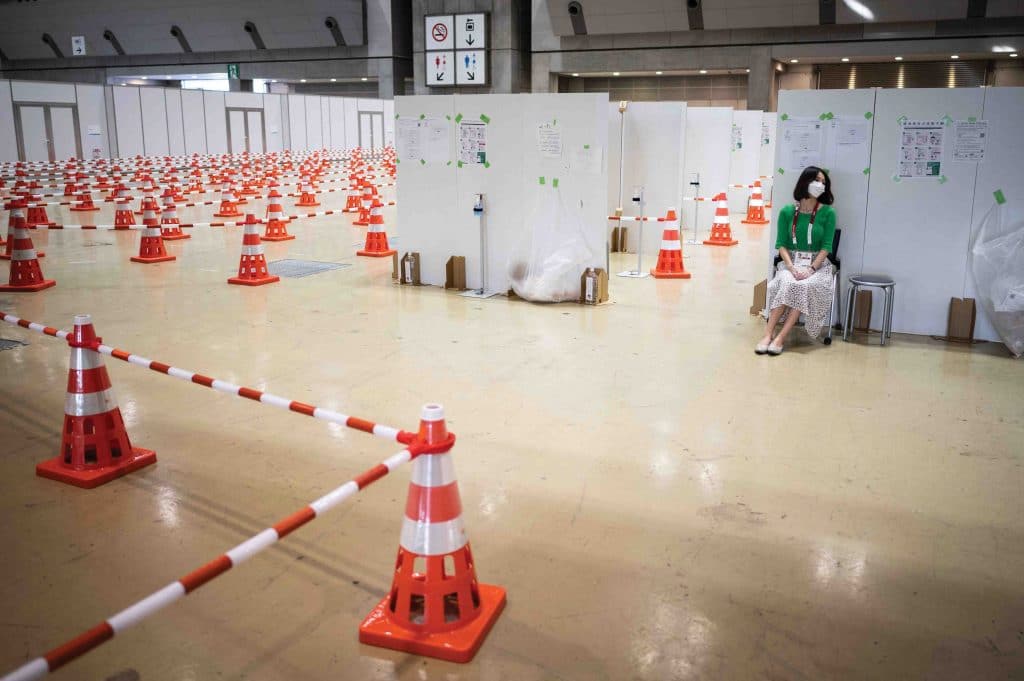
A journalist sits in the Covid-19 testing area of the Olympic media centre in Tokyo. Photo: Loic Venance/AFP via Getty Images
“I think probably the most stressful thing about the entire situation was preparing to leave,” says Coan. “The scariest part was doing our own Covid test beforehand. What if it was positive?” Coan’s test was negative and she was one of the 4,403 Paralympians in Tokyo, which eclipsed Rio as the biggest Paralympics ever. They followed the 11,500 athletes (and estimated 79,000 officials, journalists and support staff) who travelled to Japan for the Olympics. As one of those tasked with the mammoth responsibility of ensuring the safety of those travelling to Tokyo, Masa Takaya explains that the organising committee decided to create separate playbooks for each category of person – seven different classifications including athletes, broadcasters, media and Games officials. Each was designated to follow a specific Tokyo 2020 ‘journey’ in the form of strictly defined rules and protocols.
We conducted over a million tests… if an infection occurred, that person was immediately isolated”
Once in the country, they were only allowed to travel to specific locations, such as between the Olympic Village and Games venues, and were tested frequently. “We conducted a total of over one million tests,” says Takaya. “If an infection occurred inside the Olympic Village, that person was immediately isolated – and everyone deemed a close contact was also tested daily. This adherence to protecting the ‘bubble’ was key to our success in containing infections.”
“Instead of letting it distract me from my training, it just became part of the routine,” says Coan of the relentless swabbing. “Just slipping into the rhythm and making sure that those daily tasks that were absolutely crucial to keeping the Games safe were done.” Coan’s condition, osteogenesis imperfecta – a connective-tissue disorder which leaves her bones susceptible to breaks and her lungs at greater risk of infection – added to her concerns over the virus.
“If I get Covid it might not end so well for me, and that’s a really scary thought,” she says. “In the village that fear was constant. If someone was getting too close to me in line at the cafeteria I did start to get a little bit nervous. At the Games there are hundreds and hundreds of swimmers and there are only ten lanes in which to warm up and down. You’re going to be around a lot of people. I felt like I was always making this subconscious effort to stay away from people. That was mentally draining.”
I was in a state of shock. I won. Then it dawned on me: I hugged people. Oh my God, the fear”
The only time Coan’s defences dropped was when she took part in her favourite event – the 400 metres freestyle, where she faced stiff competition from Italian swimmer Giulia Terzi. “I remember putting my head down in those last 50 metres and I just told myself, ‘I don’t care what it takes, I have to get to the wall first,’” she says. “I thought back to the whole year, moving my entire life and going through the pandemic thinking, ‘What if they cancel the Games?’ I really wanted to use that as fuel: to not let everything I had been through go to waste.” It worked – Coan claimed the fourth Paralympic gold of her career. And then she forgot herself. “All of the emotions came out,” she says. “I went over and I gave Giulia Terzi a hug, but also my teammate Julia Gaffney who won bronze. I was in such a state of shock like, ‘Oh, I won.’ Then it dawned on me: ‘I hugged people.’ Oh my God, the fear.”
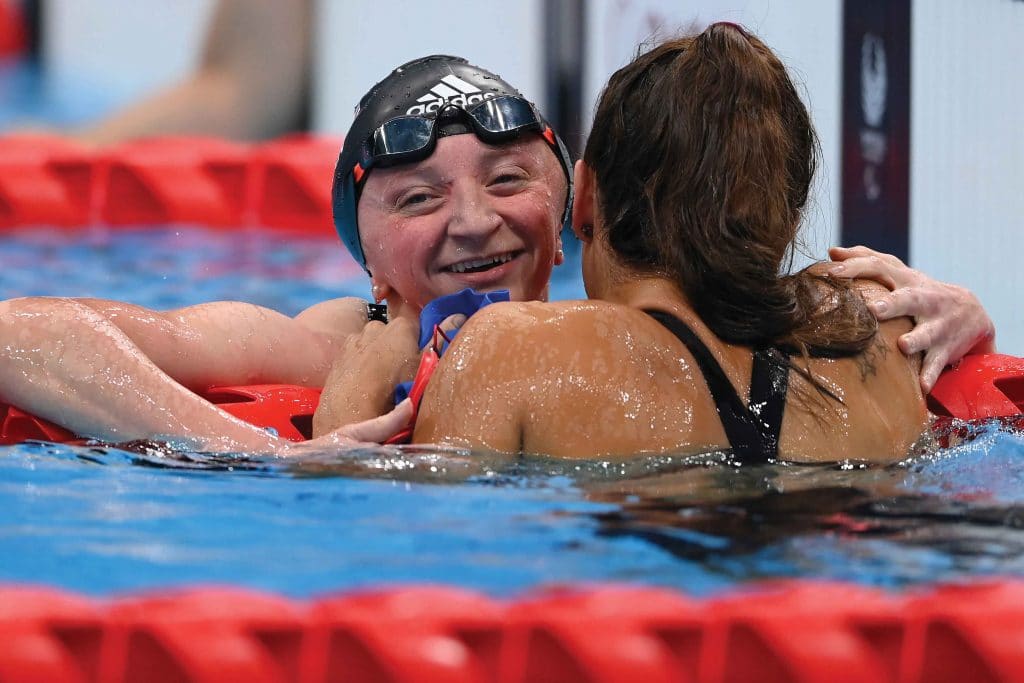
McKenzie Coan embraces silver medallist Giulia Terzi after winning the gold medal in the women’s 400m freestyle (S7) final, 29th August 2021. Photo: Alex Davidson/Getty Images for International Paralympic Committee
Thankfully no infections resulted from Coan’s celebrations, but some athletes and support staff did contract Covid during the Games. Of the 1,014,170 tests carried out, 870 were confirmed positive. “It’s not cheap to keep testing so many people, but it was the right thing to do,” says Spence. “It gave people there a level of confidence, but it also ensured that we managed to isolate immediately anyone who caught Covid, and that stopped the spread. There were so many people in the media saying the Games were going to be a super-spreader event. That never happened.”
The Games did, however, coincide with a dramatic rise in cases in Japan. The week before the Olympics started on 23rd July 2021, there were 27,234 confirmed cases; the week Coan raced to gold just over a month later there were more than 156,000. Spence denies there was any connection. “Covid comes in waves,” he says. “Case numbers were rising in Japan and people were blaming the Games, and that was frustrating. I remember one day I was so pissed off that I got up at 5am, went into the office and went through the data. Yes, the case numbers in Tokyo had gone up around 160 percent in that four-week period, but there were other cities in Japan which were a four-hour flight away where the case numbers had gone up 3,500 percent. Now, it wasn’t the Games causing that. So for people just to keep pointing the finger was really, really frustrating.”
Boykoff disagrees with the idea that the Games didn’t contribute to the rise across Japan. “Thank God there wasn’t a super-spreader event inside the Olympic bubble,” he says. “But you had all these different restaurants and bars opening later than they were supposed to, to screen the Olympics, which made it seem like [the state of emergency] wasn’t that big of a deal. The numbers skyrocketed… It’s obvious that money took precedence over public health.”
The economy was one of the reasons Japan had courted the Games so aggressively in the first place. “The Japanese economy has been stagnant for decades,” says Tak Umezawa, Japan chairman of both Cambridge Innovation Center (CIC) and the global management consultancy Kearney, who cites a declining workforce, the disaster of 2011 and historic mismanagement of the economy as the reasons for the sluggishness. “The Games were going to be the great push it needed.”
Tokyo added 250 hotels between 2013 and 2020, but with no visitors during the pandemic the bulk of the 53,000 extra rooms remained empty throughout 2021. So too did most of the local restaurants, bars and cafés hoping for a bumper summer. Slick development projects were also launched throughout the Tokyo metropolis following the 2013 host-city announcement. A scheme was accelerated to revitalise the city’s waterways, which had been extensively polluted by post-war industrialisation and further blighted by Tokyo’s 1964 Olympics urban plan – when many watercourses were either covered over with highways or entombed in concrete. One district targeted to rediscover its hidden rivers was Shibuya, known for its edgy youth culture, which experienced a lushly verdant revamp complete with skyscrapers in a bid to attract entrepreneurial startups.
One of the reasons for the redevelopment was to reinvent Tokyo as the financial and business capital of Asia. With many Western banks and businesses reconsidering Hong Kong as their Asian base in the wake of China’s increasing influence, Tokyo sensed an opening. “Both the government and private sector players were really excited about the opportunity to show off Tokyo as an innovation-driven city to the world, to demonstrate Japan’s capabilities to athletes, tourists and the business and political leaders that would come to the Games,” says Umezawa, who has advised Japan’s ministry of economy, trade and industry. “But in the end we only hosted the athletes.”
Three months after the Games, the perimeter of the Olympic Village – a complex built on one of the reclaimed islands that jut into Tokyo Bay – remains enclosed inside metal fencing, with plans in the works to transform its high-rise buildings into private residences fetching between 50 and 200 million yen (£325,000 and £1.3 million) each. Masa Takaya is confident that the sports venues that have been built across the metropolis will be a positive legacy of the Games. “The sports venues built for the 1964 Tokyo Olympics are still very much in use here, 50-odd years later – and I believe the same will occur this time as well,” he says.
When it comes to sport, the Games were an unqualified success for Japan. By the time they came to an end, the country had pulled off the highest Olympic medal sweep and second highest Paralympic total in its history. There were several moments that resonated with the Japanese public in particular along the way: 13-year-old Momiji Nishiya becoming Japan’s youngest-ever gold medallist, in the women’s street skateboarding competition; wheelchair-user Yui Wago, also 13, melting hearts with her powerful performance in the Paralympic opening ceremony as a one-winged plane finding the courage to be different; and Hidetaka Sugimura winning a thrilling gold in the individual boccia event.
Professor Itani is concerned, however, that the cheering of Japan’s sporting success will drown out voices of dissent. “This very rare moment of citizens’ defiance of the government, corporate elites and the IOC – and the rare chance to change political engagement – seems to have been lost to this celebration-slash-disaster capitalism,” Itani says “We witnessed a big surge of Covid cases which resulted in so many people suffering and even dying, but at the end of the day, the media went straight to counting gold medals.”
During October’s general election it seemed to be a case of business as usual, despite signs that a change was coming. Before the Games ended, the Liberal Democratic party (LDP), which has been in power almost continuously since its foundation in 1955, slumped to its lowest-ever approval rating of 26 percent. Many predicted the party faced a mauling in the election. But with a new leader, Fumio Kishida, installed in the wake of Japan’s sporting success at the Games, the LDP defied the opinion polls, actually increasing its majority in the lower house of the National Diet.
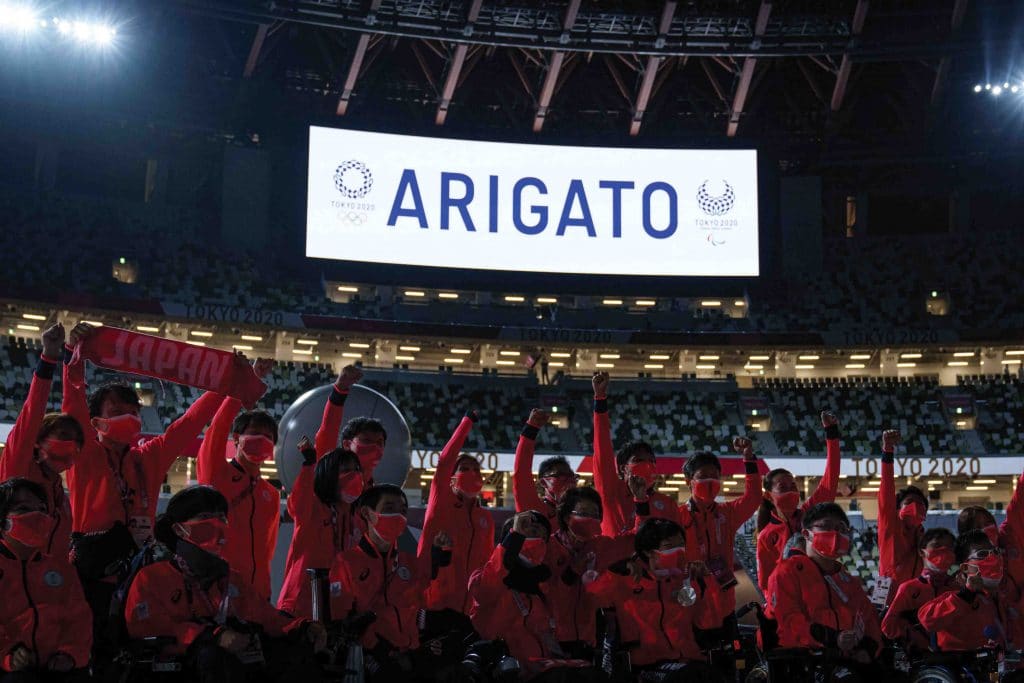
Japan’s boccia team pose in front of a sign that translates as ‘Thank you’ after the closing ceremony of the Tokyo 2020 Paralympic Games at the National Stadium, 5th September 2021. Photo: Yasuyoshi Chiba / AFP
Still, both Itani and Boykoff believe that Tokyo will mark a watershed moment in the protest movement against the Games. “I think the anti-Olympic movements got stronger both domestically and internationally, as they succeeded in revealing the fallacy of the Olympics, and the imperialist attitudes and functioning of the IOC,” says Itani. Boykoff, who argues that the residents of every potential host city should vote in a referendum about whether they want the Games, believes the IOC have countered dissent by awarding Games further and further into the future. “In Brisbane in Australia, they just got handed the 2032 Olympics 11 years in advance; no public vote,” he says. “I had to scrape and scrounge the internet just to get the bid documents, which are totally sketchy and vague. I am arguing for more transparency, more democracy, more public voice, because when your city gets the Olympics, it changes your city and so people that live in the city should have a voice. The IOC is moving in the opposite direction.”
As of November 2021, Japan’s Covid rates are among the lowest since the pandemic began, indicating that the worst-case Olympics scenario was avoided. New border restrictions imposed to try to keep out the Omicron variant have further restricted international access to the country.
The early analyses of the Games’ economic effect don’t make for optimistic reading. “In 2017, the rosy story projected by the Tokyo Metropolitan Government was that the economic impact of hosting the 2020 Games would be more than 32 trillion yen (£211.6 billion),” says Umezawa. “The direct contribution from the Games was to be 5.2 trillion yen, with the balance being a legacy effect which would come from the conversion of the Olympic Village and additional tourism and international business demand. Covid destroyed those plans completely.” According to research by Katsuhiro Miyamoto, an economics professor at Kansai University, the actual direct contribution of the Games was 3.3 trillion yen, 1.9 trillion yen less than forecast. The difference in the legacy effect could be even starker – Miyamoto estimates the indirect contribution at just 2.9 trillion yen. “We still have to see what the lasting impact from the new infrastructure will be,” says Umezawa. “But in reality I can’t see that being 26 trillion yen”.
For the organisers, Tokyo 2020’s impact can still match the lofty ambitions of 2013. “Positive social change is built within the Tokyo 2020 vision in numerous ways,” says Takaya. In addition to the hard legacy of the sports venues, he also points out the soft aspect in terms of an inclusive, globally oriented society.
We showed that anything is possible and that changes the mindset. There will be a massive attitudinal switch in Japan towards disabilities”
“In terms of the Paralympic legacy, I think Japan now has a whole new set of heroes who have disabilities,” agrees Spence. “When [Sugimura] won gold in the boccia, he was front-page news. He achieved hero status. That would never have happened without the Paralympics; you would never have someone with severe cerebral palsy on the front page of a Japanese newspaper, and sport did that. We showed that anything is possible and that changes the mindset. There will be a massive attitudinal switch in Japan towards disabilities. I’m sure that over the coming years we’ll see more people with disabilities in employment as a result.”
Spence’s big regret over the Games is that there weren’t any spectators there to see them. “Not having people in the stadium enjoying and supporting the athletes was devastating,” he says. “Had they had spectators, our president would’ve stood there [at the closing ceremony] and gone, ‘These have been the greatest Games in history,’ without a doubt.” Although nobody was in the stadium, supporters did still make themselves heard. “When we left the closing ceremony on buses, the streets outside the stadium were lined with thousands of people cheering us – it was insane,” says Spence. “We’ve gone from protests to people who don’t want the Games to end. So to change that public opinion over the course of six weeks of sport with the Olympics and Paralympics was phenomenal to see. I remember on the bus, we all just cried. We were like, ‘We’ve done it.’”
As for economic advisor Tak Umezawa, all he can do is look back and wonder what might have been. “If we can be hypothetical – imagine Tokyo had lost the bid for 2020. I think we would have won the right to host the 2024 Games instead. That would have been a better scenario. All that investment would not be in vain. But we live in the real world and I’m glad we didn’t cancel the Games. We’d built the infrastructure already, so why not host the athletes and demonstrate that Tokyo can deliver what it promised. And we did that. We kept our word.”
Slow Journalism in your inbox, plus infographics, offers and more: sign up for the free DG newsletter. Sign me up
Thanks for signing up.
